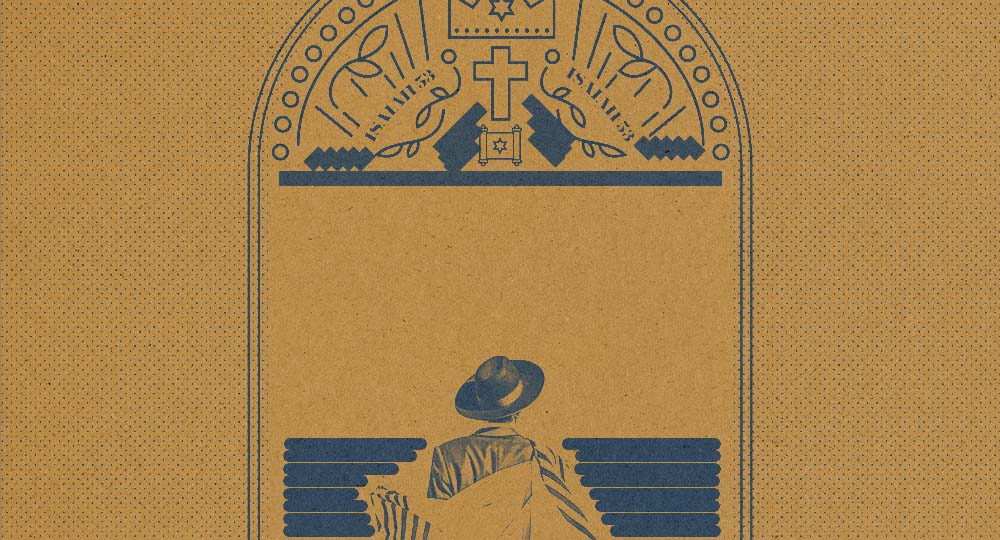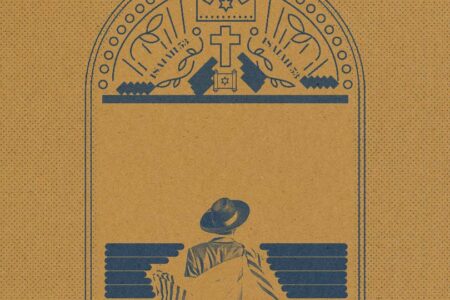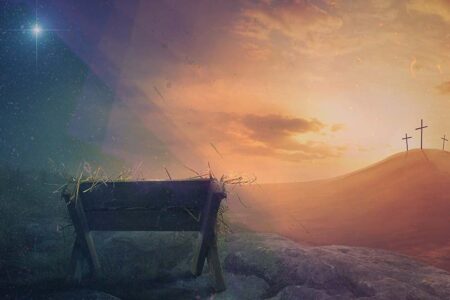The ‘Forbidden Chapter’
Why Isaiah 53 may be the most important text in the Old Testament
What joy was mine when I ministered in Israel for one month each year when I served as director of International Ministries for The Friends of Israel Gospel Ministry. I always began in Jerusalem, spending a week with Zvi Kalisher. Most of you know Zvi through his popular column, “Apples of Gold,” that runs on the back pages of each issue of Israel My Glory.
Zvi has been with the Lord since 2014. But I think of him often because he was one of a kind: a Jewish Holocaust survivor who loved Jesus with all his heart and told everyone he met about Him. Everyone.
Zvi moved to Israel at age 18 after World War II, came to know the Lord there, and spent his life serving Him. When I visited, Zvi took me every day into Mea Shearim, the section of Jerusalem where the ultra-Orthodox live. These are the Haredim, the Jewish men with long side curls who wear black suits, black hats, and prayer shawls with the fringes often visible. They strictly follow rabbinic law, limit their contact with outsiders, and are so intensely zealous in their religious beliefs that they are known to get physical with people who try to speak to them about Yeshua (Hebrew for “Jesus”).
But Zvi was not afraid. Into this environment he went daily to speak tactfully and gently about the Messiah of Israel. He loved his people and wanted God to show them the truth.
We would walk into a yeshivah (Orthodox school) in Mea Shearim where young Haredi men pored over books, studying the Talmud and other commentaries that discuss the meaning of Old Testament passages. Men sit all day in the yeshivahs, studying. Zvi would sit down beside someone who was deep in thought, tap him on the shoulder, and start a conversation about Isaiah 53. “Who is the man referred to in Isaiah 53?” he asked, “and how do you interpret this chapter?”
After reading the chapter, the man inevitably would reply, “I will need to ask my rabbi.” It was his way of trying to avoid conversation on the subject. But Zvi would persist, asking more questions about the chapter. Often, a lively discussion would ensue as other men gathered to share their opinions. More times than not, the discussion became intense, loud, and heated. Sometimes it erupted into loud Haredi denials, shouting, and condemnation of Zvi’s interpretation of this Messianic passage.
Yet Zvi never became rattled or emotional. He never grew angry but lovingly stood his ground, engaging people in conversation until they ended the discussion. He often closed with an invitation to his home for further discussion on Isaiah 53 and other passages of Hebrew Scripture. He even gave out his telephone number, urging the men to visit him. And some did.
In speaking with them, Zvi called Isaiah 53 the “forbidden chapter.” Why? Because most Jewish men do not want to discuss it. It is as clear and perfect a description of Jesus Christ as the Bible presents anywhere, including in the New Testament. Yet it was written by the Jewish prophet Isaiah to the Jewish people approximately 700 years before Jesus was born.
Interestingly, Isaiah 52:13—53:12 has been omitted from the synagogue reading of the Haftorah (passage from the prophets) during the Sabbath service. If you ask why, rabbis typically reply, “Not every text in the prophets is assigned to be read.”
Past, Present Jewish Interpretation
Isaiah 53 speaks of the suffering Servant of the Lord. Though not identified by name, all of Scripture makes it exceedingly clear the Servant is none other than Israel’s Messiah.
The word Messiah literally means “the anointed one.” It was first used in connection with the pouring of holy oil over the head of a Levite at his consecration for the priesthood and over the head of the king of Israel at his coronation.
Centuries ago, the concept of Messiah was somewhat of a paradox to Jewish people because the Hebrew Scriptures portray Him as both a suffering servant who will give His life to deliver them (53:1–12) and a king who defeats and subjugates all of Israel’s enemies and sets up a Messianic Kingdom of peace and prosperity in the land (65:17–25).
This conundrum led to the belief of two Messiahs. The first was called Messiah ben Joseph, who would fight Israel’s battles for freedom and peace but be killed in the process; the second was Messiah ben David, who would usher in the kingdom of peace promised to Israel and eventually the world.
Over time, many Jewish scholars decided Isaiah 53 refers not to the suffering servant but rather, to the suffering of Israel for the sins of the nation. However, this interpretation is incorrect for obvious reasons:
→ The personal pronouns He, Him, and His clearly refer to an individual who suffers, is rejected, and dies. The pronouns we, us, and our refer to Israel witnessing the individual’s suffering.
→ The one suffering does so voluntarily, willingly, and silently, without opening His mouth in opposition (v. 7). Such was never the case with Israel.
→ The one suffering is put to death on Israel’s behalf as “an offering for sin” (v. 10, cf. v. 8). The people of Israel, like people everywhere, are sinners and cannot become an atonement to pay a redemptive price.
→ The one suffering is innocent (v. 9). Isaiah (and all the other prophets) clearly said Israel was guilty of sin and suffered because of it (1:4–8).
→ The one suffering died for the sins of Israel and all mankind (53:4–6, 8, 10–12). Israel never died vicariously for anyone’s sin.
Today, there are two major Jewish views of Isaiah 53. The Orthodox believe a personal Messiah will appear in Israel, but he will not be divine. He will be a man from God who will do four things: deliver Israel from its enemies, judge Israel’s enemies for their treatment of Israel over the centuries, bring peace to Israel, and set up a Messianic Age (a time of peace for Israel and the world).
Other branches of Judaism maintain there will be no personal Messiah who brings peace. Israel’s peace will come only as men and nations sit down and negotiate it; and then peace will come to Israel and all nations forever.
The Fact of the Matter
It has been said without exaggeration that Isaiah 53 may be the most important text in the Old Testament. This view is borne out by the many portions of the chapter that appear in the New Testament, the vast amount of literature published concerning Isaiah 53 over the centuries, and how often its meaning has been debated by Jewish and Christian apologists.
This text is one of the greatest pieces of literature ever written. Not only does it deal in graphic detail with the Servant’s extreme rejection, suffering, humiliation, and death, it also broadcasts His glorious exaltation and resurrection back to life, revealing Him as the divine Messiah who fulfilled the mission He was called to Earth to perform.
Chapter 53 actually should begin with 52:13, which is part of the logical progression of thought. The original books of the Bible contained no chapters or verses. The Hebrew Scriptures were not divided into chapters and verses until 1448.
The entire section of Isaiah 52:13—53:12 consists of five strophes (structural divisions of a poem containing stanzas of varying line-length) with three verses each. These verses describe in astonishing detail Israel’s Messiah.
One: The Servant’s Supremacy (52:13–15)
An individual is introduced as the faithful Servant of Jehovah. Here Isaiah provided an overview of both the Servant’s humiliation and exaltation. He “shall be exalted and extolled and be very high” (after His resurrection, v. 13); yet His face and form will become so marred He will no longer look human (His torture and death, v. 14). The extreme cruelty heaped on Him will leave people standing in astonishment at His horrifying appearance.
Through His suffering “He [will] sprinkle many nations” (v. 15), or accomplish God’s redemptive program not only for Israel, but for the world. (Levitical priests sprinkled the blood of a sacrifice on objects to purify them.)
Kings and world leaders will remain speechless, overtaken with awe by how this once-despised Servant is exalted (His resurrection, v. 15).
Two: The Servant Scorned (53:1–3)
Few people will believe the prophecies about the Messiah because nothing about His appearance will attract them. He will be plain, with “no beauty that we should desire Him. He was despised and rejected by men, a Man of sorrows” (vv. 2–3).
Three: The Servant’s Suffering (vv. 4–6)
He will endure unbearable suffering “for our transgressions” and will become the recipient of God’s wrath, allowing Himself to be “bruised for our iniquities” as the final, atoning sacrifice for sin (v. 5).
Four: The Servant’s Submission (vv. 7–9)
When led before His accusers and condemned to death, He will remain silent. He will not try to defend Himself, protest, or fight for His rights. Instead, He will become a submissive sacrifice, “led as a lamb to the slaughter” (v. 7). He will be taken from prison and cut off in death. “For the transgressions of My people He was stricken” (v. 8); yet “He had done no violence, nor was any deceit in His mouth” (v. 9). Thus, He will be sinless and undeserving of death.
Five: The Servant’s Sacrifice (vv. 10–12)
“Yet it pleased the LORD to bruise Him” (v. 10). It is God’s will for the Messiah to die, “when You make His soul an offering for sin” (v. 10). It is also the Father’s will that He be resurrected. Thus, “He shall prolong His days, and the pleasure of the LORD shall prosper in His hand” (v. 10).
“By His knowledge My righteous Servant shall justify many, for He shall bear their iniquities” (v. 11). The Father will be completely satisfied, and the Messiah will be greatly rewarded for His ministry because “He poured out His soul unto death, and He was numbered with the transgressors, and He bore the sin of many, and made intercession for the transgressors” (v. 12).
There is no clearer description anywhere of the person and work of the Lord Jesus Christ, who came first to the “lost sheep of the house of Israel” (Mt. 15:24) and who now offers salvation to everyone through faith in Him. He died as the final sacrifice for sin and today lives to make intercession for all who come to God through Him (Heb. 7:25). When He returns, He will reign forever as King of kings and Lord of lords over the House of David and the world.
Isaiah 53 should never be treated as the “forbidden chapter” but, rather, as the greatest chapter ever written.









David,
I have neighbor friends who are Jewish. How can I help them reconcile what you wrote above with this article from Jews For Judaism:
https://jewsforjudaism.org/knowledge/articles/isaiah-53-and-the-suffering-servant
Thanks!
Brian
Clearly describes Jesus
amen
Thank you for your in-depth explanation of Isaiah 53. I wish more people would read it and support the State of Israel. I believe you are the author of the 12 Tribes of Israel and where are they now? I read it many years ago and found it very enlightening. I give many of my FOI books away, and must order another copy.
I am also using the book, The Most High God, by Dr. Renald Showers, as a help in my study of the books of Revelation and Daniel. I am Praying for FOI and staff. Blessings to you all, Because He Lives, Elaine
Dear Mr Levy, thank you for writing and explaining Isaiah chapter 53. I am a gentile, follower of Jesus Christ the Messiah. When I read Isaiah 53 I was blessed as the Lord opened my eyes to confirm that Jesus Christ is the Messiah who came to save the world from sin. As I read Isaiah 53 and on, it became so obvious to me Isaiah was referring to the suffering messiah. I pray the Lord will open the eyes and soften the hearts of his people so they may see and know that their messiah is here now. May the peace and joy of our Lord Jesus Christ be with you today.